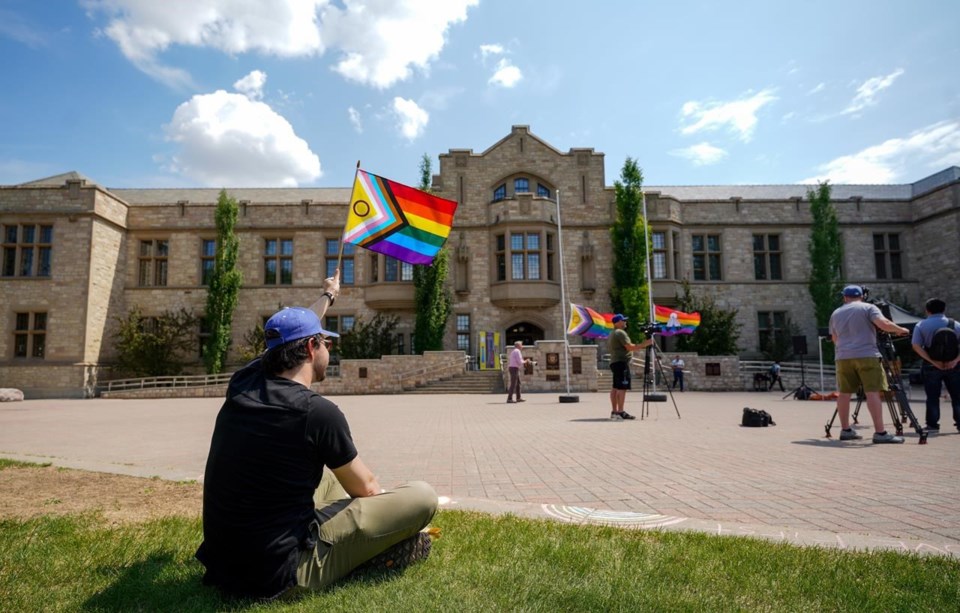REGINA — A Saskatchewan judge heard arguments Tuesday over an injunction application that aims to halt a policy requiring students under 16 to receive parental consent if they want to go by different names or pronouns at school.
Lawyers for UR Pride, an organization representing LGBTQ people in Regina, argued for the injunction, describing the policy as discriminatory because it could result in teachers misgendering students unable to get parental consent.
Adam Goldenberg, a lawyer representing the group, told court it could also out students, potentially putting them at risk if they aren't accepted at home.
He said these repercussions violate the Charter of Rights and Freedoms, including equality rights and the right to security of the person.
The policy also does not account for the mature minor doctrine, a common-law rule that gives mature children autonomy, said Goldenberg.
"There's expert evidence establishing a range of irreparable harm, including extreme irreparable harm, that the policy would cause, exacerbate, or at the very least, make more likely," he said.
"Having no policy would better serve the public interest."
Mitch McAdam, the province's lawyer, told court the attorney general is opposed to the injunction, arguing the policy has been misinterpreted.
McAdam said students who are worried they won't receive parental consent are to be provided with professional counselling at school.
The counsellor is to work with the student until they are ready to seek parental consent, he said.
"It's my submission that those submissions are inaccurate and unfair, and they're unnecessarily inflammatory," McAdam said. "The court needs to look at what the policy actually says and make a ruling based on what the policy says."
McAdam argued the issue is also about "drawing distinctions based on age."
"I think it's about where is the appropriate place to draw that line," he said. "Is it 16, as determined by the Ministry of Education? Or is it somewhere else? Is it 13, 14? Because, surely, it won't be 12."
Goldenberg argued the mature minor doctrine allows children under age 16 to make important decisions, like their own medical treatment.
"There is a situation where there might be a young person who would be mature enough to consent to a medical treatment, but under this policy, is not able to have their gender identity recognized," he said.
Justice Michael Megaw, who is hearing the injunction application, reserved his decision. He said he will make a decision as soon as possible.
Premier Scott Moe has said he stands by the policy and that the province will do everything in its power to protect parental rights.
The premier said he would consider using the notwithstanding clause, a provision that allows governments to override certain Charter rights for up to five years.
Michael Walter, the Education Ministry's assistant deputy minister, said in an affidavit that he received 18 letters between June and August from people expressing concerns about students using chosen pronouns and names in school. The letters referenced a similar policy in New Brunswick, which came before the one in Saskatchewan.
In his affidavit, Walter said the chief of staff in the Education Ministry told him that constituents of some legislature members were concerned.
Goldenberg described this correspondence as "weak" evidence, as the constituents and their political representatives were not identified.
"That's at least triple hearsay," he said. "The chief of staff told (Walter), the MLAs told him, the constituents told the MLAs that parents had concerns about something happening in schools.
"They go from zero to a final version of the policy in nine days in August," Goldenberg said. "This was not a thoughtful active policy creation."
McAdam argued even though the government developed the policy quickly, it was still acting in the public interest.
He also argued there had been one case at a school where parental consent was required when a student wanted to go by a different name and pronoun.
However, he did not provide every school division's pronoun policy, as this was not outlined in Walter's affidavit.
Megaw took note of this, calling it a "notable absence of information."
UR Pride's lawyers said an injunction would pause the policy while a challenge makes its way through court.
Saskatchewan child advocate Lisa Broda said in a report last week that the policy violates rights to gender identity and expression.
Megaw granted five organizations intervener status in the case: the Canadian Civil Liberties Association, John Howard Society, Women's Legal Education and Action Fund, the Gender Dysphoria Alliance and Alberta-based Parents for Choice in Education.
The judge is to also decide whether UR Pride is granted public interest standing in the case.
McAdam said the attorney general is seeking costs over the litigation, which is considered a rare move.
This report by The Canadian Press was first published Sept. 19, 2023.
Jeremy Simes, The Canadian Press
Note to readers: This is a corrected story. A previous version misspelled the last name of Adam Goldenberg.



